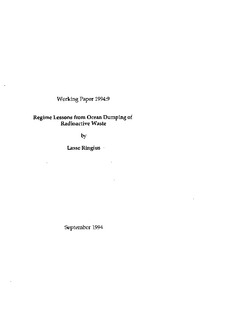| dc.contributor.author | Ringius, Lasse | nb_NO |
| dc.date.accessioned | 2014-03-17T14:31:11Z | |
| dc.date.available | 2014-03-17T14:31:11Z | |
| dc.date.issued | 1994 | nb_NO |
| dc.identifier.issn | 0504-452X | nb_NO |
| dc.identifier.uri | http://hdl.handle.net/11250/192214 | |
| dc.description.abstract | Standard explanations for international environmental regime change do not account for the 1993 ban by states on ocean dumping of radioactive waste. This significant development was in large part caused by a trans-national coalition of small states and environmental non-governmental organizations. The 1993 global ban reflected international public opinion on this international issue, but was at odds with the views of the scientific community and had long been resisted by powerful states. The global regime regulating ocean dumping set norms and standards for dumping of radioactive waste against which individual countries' ocean dumping policies were compared and judged by other countries, environmental non-governmental organizations and the public. The global dumping regime significantly raised the political costs of noncompliance and states disregarding regime rules became subject to domestic and international criticism and scorn, and subsequently pressure to act. | nb_NO |
| dc.language.iso | eng | nb_NO |
| dc.publisher | CICERO Center for International Climate and Environmental Research - Oslo | nb_NO |
| dc.relation.ispartof | CICERO Working Paper | nb_NO |
| dc.relation.ispartofseries | CICERO Working Paper;1994:09 | nb_NO |
| dc.title | Regime lessons from ocean dumping of radioactive waste | nb_NO |
| dc.type | Working paper | nb_NO |
| dc.source.pagenumber | | nb_NO |
